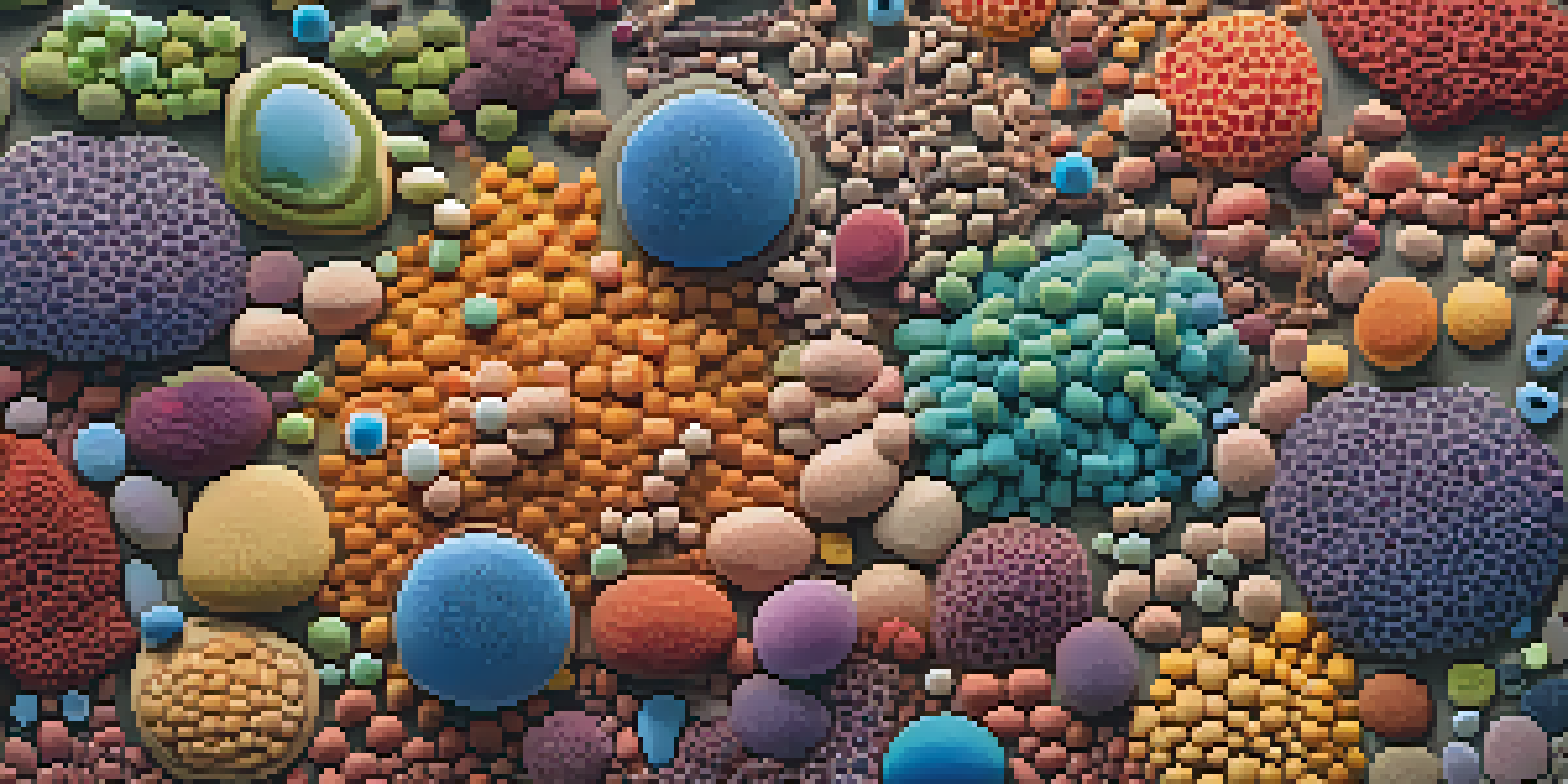Psychedelics and the Microbiome: Impacts on Immunity

Understanding Psychedelics and Their Effects
Psychedelics are substances that can alter perception, mood, and cognitive processes. Common examples include psilocybin, found in certain mushrooms, and LSD. These compounds have been used for centuries in various cultural and therapeutic contexts, sparking renewed interest in their potential health benefits.
Psychedelics can provide a new lens through which we can view mental health, emphasizing the importance of understanding the gut-brain connection.
Recent research suggests that psychedelics may have a role in mental health treatment, particularly for conditions like depression and PTSD. However, their impact goes beyond just the mind; emerging studies indicate they may also influence physical health, particularly through the microbiome.
This connection between psychedelics and gut health is where the real intrigue lies. By understanding how these substances interact with our microbiome, we can explore their potential to enhance overall immunity and well-being.
The Microbiome: A Crucial Player in Immunity
The microbiome refers to the trillions of microorganisms living in and on our bodies, particularly in our gut. These microbes play a vital role in digestion, metabolism, and most importantly, our immune system. A balanced microbiome contributes to a robust immune response, while an imbalance can lead to various health issues.

Factors such as diet, lifestyle, and environmental exposures can significantly affect the composition of our microbiome. For instance, a diet rich in fiber supports beneficial bacteria, while a high-sugar diet can promote harmful strains. This balance is crucial for maintaining immunity and overall health.
Psychedelics' Role in Health
Recent research suggests that psychedelics may offer therapeutic benefits for mental health and influence physical well-being.
As researchers delve deeper into the microbiome's complexities, they uncover connections between gut health and various diseases. This growing understanding sets the stage for exploring how psychedelics might influence these microbial communities and, by extension, our immune systems.
How Psychedelics May Affect the Microbiome
Psychedelics have been shown to influence gut health in various ways, which could be linked to their effects on the microbiome. Some studies suggest that these substances may promote microbial diversity, which is essential for a healthy gut. A diverse microbiome can enhance immune function and protect against pathogens.
The microbiome is a key player in our health, and understanding its relationship with psychedelics may pave the way for innovative therapies.
Additionally, psychedelics may reduce inflammation in the gut, creating a more favorable environment for beneficial bacteria to thrive. For example, some research indicates that psilocybin can modulate the immune response, potentially leading to improved gut health and resilience against infections.
While the exact mechanisms remain under investigation, the potential for psychedelics to positively impact the microbiome opens new avenues for research. This could lead to innovative treatments for various ailments linked to gut health and immune function.
The Link Between Microbiome and Immunity
The relationship between the microbiome and the immune system is intricate and multifaceted. A healthy microbiome contributes to the development and regulation of immune cells, helping the body distinguish between harmful invaders and harmless substances. This process is crucial for preventing autoimmune diseases and allergies.
Conversely, an imbalanced microbiome can lead to a weakened immune response, making the body more susceptible to infections and diseases. For instance, dysbiosis, or microbial imbalance, has been linked to inflammatory bowel disease and other immune-related disorders.
Microbiome's Impact on Immunity
A balanced microbiome is crucial for a strong immune response, highlighting the importance of gut health.
Understanding this connection emphasizes the importance of maintaining a healthy microbiome. It also raises intriguing questions about how psychedelics may support this balance, potentially paving the way for new therapeutic strategies in immunology.
Research Insights: Psychedelics and Immunity
Recent studies exploring the effects of psychedelics on the immune system are still in their infancy, but preliminary findings are promising. Some research indicates that psychedelics can enhance the production of certain immune cells, potentially improving the body’s ability to fight infections. This could be particularly beneficial for individuals with compromised immune systems.
Moreover, psychedelics' anti-inflammatory properties may contribute to better immune regulation. By decreasing chronic inflammation, these substances could help restore balance to the immune system, promoting overall health.
While the research is ongoing, the implications of these findings could transform how we understand the interplay between psychedelics, the microbiome, and immunity. As more studies emerge, we may uncover new therapeutic potentials that could benefit countless individuals.
Potential Therapeutic Applications of Psychedelics
If the connection between psychedelics, the microbiome, and immunity holds true, it could lead to innovative therapeutic applications. For instance, combining psychedelic therapy with microbiome-focused treatments may enhance overall health outcomes. This could be particularly valuable for patients suffering from chronic illnesses linked to immune dysfunction.
Furthermore, the potential to use psychedelics in conjunction with gut health interventions opens new doors for holistic approaches to treatment. Imagine a future where mental health therapies include not just traditional methods but also psychedelic-assisted sessions that promote gut healing.
Potential of Psychedelics in Therapy
Combining psychedelics with microbiome-focused treatments may lead to innovative approaches for addressing chronic illnesses and improving overall health.
Such integrative strategies could revolutionize how we approach healthcare, emphasizing the importance of both mental and physical well-being. This holistic perspective aligns with the growing trend of personalized medicine, where treatments are tailored to individual needs.
The Future of Psychedelics and Microbiome Research
As interest in psychedelics continues to grow, so does the need for rigorous research into their effects on the microbiome and immunity. Future studies should focus on understanding the mechanisms behind these interactions, as well as their long-term implications for health. This research could provide valuable insights into how we can harness the benefits of psychedelics responsibly.
Moreover, interdisciplinary approaches that combine microbiology, immunology, and psychology will be essential in unraveling the complexities of these relationships. Collaborative research efforts can help bridge the gaps in our current understanding and pave the way for innovative therapies.

Ultimately, the future of psychedelics and microbiome research is bright, with the potential to transform our approach to health and wellness. As we continue to learn more about these fascinating connections, we may uncover new pathways to healing and resilience.